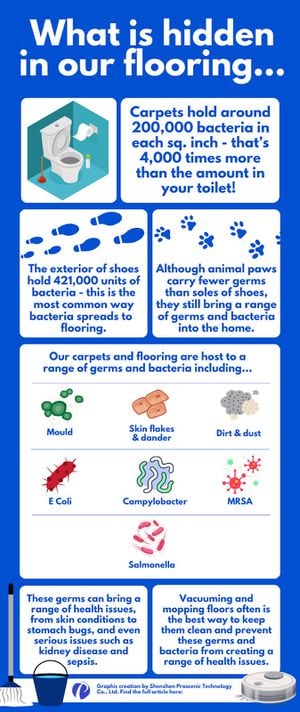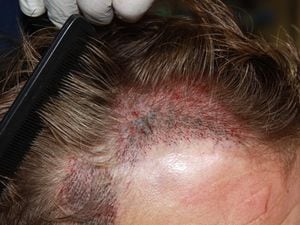Why the three-second rule is actually bad for you as floors harbour more bacteria than toilets
Everyone's heard of the three-second rule whereby it's generally thought to be okay to eat food that's been dropped on the floor if you pick it up within three seconds.

But, and this will come as a shock to some of you, it's actually a very bad move to eat anything that's been on the floor... full stop!
Interesting new research has highlighted the fact that there are risks involved if you abide by the holy three-second rule, and as you read on, you'll probably start thinking twice before picking that piece of pasta of the floor.
It certainly comes as no surprise that the three second rule does not prevent you becoming ill - we're just in denial.
The research, by home appliance company Prosenics, shows that carpets hold around 200,000 bacteria per each square inch - a toilet has 50,000. What's worse is that, according to the company's last survey, 16.4 per cent of those who participated never clean their floors.
So what really lies beneath your feet?
Prosenic summed up the four worst illnesses that can be contracted, however quickly you pick up that dropped crisp.
E Coli
E. Coli bacteria is most often 'walked' into the house on the soles of shoes, and there's a higher chance of it appearing in homes with pets. Becoming infected by E. Coli is very unpleasant and includes diarrhoea, nausea and vomiting, and mild to severe stomach cramps. Take shoes off before going into your home, and try to clean your pet's paws when they come in, too.
Salmonella
Salmonella thrives in carpets and is also brought in from shoes and pets. One of the common ways of becoming infected is by eating food that has fallen on the floor. Most people will develop diarrhoea, fever, and stomach cramps within 72 hours, and if the infection spread beyond the intestines, it can cause life-threatening problems. The same with E. Coli, leave your shoes at the door and give your pet's paws a wipe.

Methicillin-resistant Staphylococcus Aureus (MRSA)
MRSA can be brought into the home through shoes, gym bags and equipment. It is a difficult bacteria to treat and is also referred to as a ‘superbug’ – it becomes more serious as it gets deeper into the body and causes symptoms such as redness, swelling, and warmth on the skin, as well as high temperature, chills, and dizziness. MRSA can get into your bloodstream which can cause other diseases like endocarditis (when bacteria infects the heart) and even sepsis - these situations are difficult to treat, and if they aren’t, can be fatal. Give your equipment a wipe before putting it down in the house, and leave your gym bag by the door, or in a separate room to the one you cook in.
Campylobacter
This bacteria most commonly lives in carpets during the winter months, especially in damp carpets and is particularly dangerous to those with weakened immune systems, children and the elderly. According to the World Health Organisation, Campylobacter bacteria is one of the leading causes of diarrhoeal disease. It can lead to Campylobacterosis, the symptoms of which include diarrhoea, cramping, abdominal pain, fever and potentially nausea and vomiting. If left untreated, it can cause gallbladder infection, as well as some rare side effects such as IBS and kidney disease. Give your carpet a clean once in a while, and avoid eating food off it...





